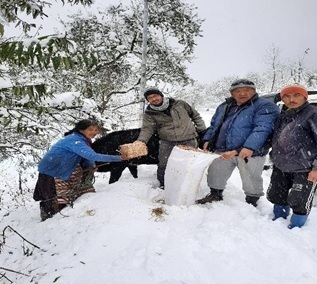Introduction of feed blocks proved boon for Yak rearing community in Northeastern Sikkim
Details:
In the Northeastern part of India, yaks are raised by the highland tribal nomads of Brokpa (in Arunachal Pradesh) and Dokpa (in Sikkim) communities. Besides, the yak plays an important role in the social and religious life of these communities.
The key problem of yak rearing in North Sikkim is the Animal feed and fodder scarcity particularly during the winter season. Traditionally, Yak’s graze on high altitude pasture grasses. Due to the modern infrastructure development near the high-altitude International Borders and seizing of borders has restricted the available pasture area for grazing. As a result, the pastures are overgrazed and day by day degrading due to encroachment and overgrowth of obnoxious weeds and grasses on the pastures. These losses could be compensated by supplementation of complete feed blocks prepared from locally available fodder resources such as maize stover, paddy/millet straw and concentrated feed.
“Earlier thousands of Yaks died due to the non-availability of grass due to continuous snow fall in winters. However, after the feed blocks were provided, not only milk production was enhanced but also good quality milk and ghee were produced. Now youth are interested in taking it as profession,” said a Yak herder from North Sikkim
Silage making in poly bags in another technology of conservation of surplus green forages for lean period. The technology is found effective in ensiling high altitude tree forages like Willow tender twigs and leaves for offering to the animals during feed scarcity periods. Both these technologies have been extensively demonstrated and popularised among the highland farming communities of Arunachal Pradesh and North Sikkim.
Principal Investigator: Dr Vijay Paul, ICAR-National Research Centre on Yak, Dirang, Arunachal Pradesh
Contact info: vpaul.nrcy@googlemail.com
Implementing Agency: ICAR-National Research Centre on Yak, Dirang, Arunachal Pradesh
Funding Agency: Department of Biotechnology (DBT)
